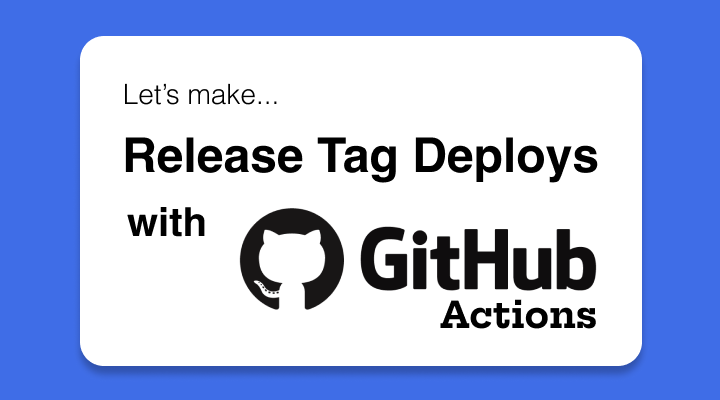At work, when we release a new version of our Capacitor app, we always deploy to the web, but we conditionally deploy to CodePush instead of the AppStore based on whether it is a minor (or patch) release or a major release.
To automate this system and have our deploys run in Github Actions, we need to conditionally run jobs based on the tag name of the release. There wasn't a lot of documentation on how to set this up. So, I thought I'd write this quick blog post on how to do it.
Quick Note
We setup this workflow to be conditional on the semantic version number (i.e. vMajor.Minor.Patch). However, you could also setup a similar system by reading anything in the release tag name (i.e. appending -apk, -web, -codepush). It's just up to you and how you'd like to work.
Getting the version number
Let's define a job that will expose each component of our version number so we can use them in conditional logic for future jobs. To do that, we'll need to:
- Access the tag name
- Parse the tag name for each component of the version number (v1.2.3)
- Use Github's
outputsfeature to set those numbers as variables we can use throughout our workflow file.
Accessing the tag name
Let's start with a new, dummy workflow.yml file with a blank job that runs whenever we publish a new release.
name: Deploy Release
on:
release:
types:
- "published"
jobs:
GetVersion:
runs-on: ubuntu-latest
steps:
- run: echo "A new release!"
In order to use our version number in conditionals for future jobs, we need to extract it from the tag name or the release. Lucky for us that's available via the job context using github.ref_name . So, let's expose that to the global workflow env.
name: Deploy Release
on:
release:
types:
- "published"
env:
VERSION: ${{ github.ref_name }}
jobs:
GetVersion:
runs-on: ubuntu-latest
steps:
# This is just bash 👇
- run: echo "A new release with version number ${VERSION}!"
Nice! Now our version number is globally available! Let's use it to grab each component of the semantic version.
Parsing bash strings using cut
Let's examine our tag name / versioning string: v1.2.3
In order to parse out each component of the number, we first need to get rid of that v at the start. We can do that by using bash paramater expansion like so:
echo ${VERSION##*v}
"1.2.3"
And once we have that purely period (.) delineated string, we can use bash's cut command with the -d flag to get each individual component.
echo "$(echo ${VERSION##*v} | cut -d'.' -f1)"
1
echo "$(echo ${VERSION##*v} | cut -d'.' -f2)"
2
echo "$(echo ${VERSION##*v} | cut -d'.' -f3)"
3
Perfect! Now, all we have left to do is integrate this script into our workflow.
Setting outputs for a job
In order to use these numbers as conditionals for jobs, we need to essentially "export" these as variables from one job and "import" them into another. We do that using outputs in Github Actions.
The syntax is strange and doesn't make a lot of sense - so rather than trying to explain it, just look at the example 😆.
name: Deploy Release
on:
release:
types:
- "published"
env:
VERSION: ${{ github.ref_name }}
jobs:
GetVersion:
runs-on: ubuntu-latest
outputs:
minor: ${{ steps.minor.outputs.number }}
patch: ${{ steps.patch.outputs.number }}
steps:
- id: minor
run: echo "::set-output name=number::$(echo ${VERSION##*v} | cut -d'.' -f2)"
- id: patch
run: echo "::set-output name=number::$(echo ${VERSION##*v} | cut -d'.' -f3)"
Notice how we're actually exporting job-level outputs (minor, patch) from step-level outputs (number). We reference outputs using the id of the step. Next, we'll see how we can "import" these job-level outputs in another job.
Running jobs conditionally
Let's declare three new jobs: Major, Minor, and Patch.
name: Deploy Release
on:
release:
types:
- "published"
env:
VERSION: ${{ github.ref_name }}
jobs:
GetVersion:
runs-on: ubuntu-latest
outputs:
minor: ${{ steps.minor.outputs.number }}
patch: ${{ steps.patch.outputs.number }}
steps:
- id: minor
run: echo "::set-output name=number::$(echo ${VERSION##*v} | cut -d'.' -f2)"
- id: patch
run: echo "::set-output name=number::$(echo ${VERSION##*v} | cut -d'.' -f3)"
Major:
runs-on: ubuntu-latest
steps:
- run: echo "Doing the things for MAJOR version change..."
Minor:
runs-on: ubuntu-latest
steps:
- run: echo "Doing the things for MINOR version change..."
Patch:
runs-on: ubuntu-latest
steps:
- run: echo "Doing the things for PATCH version change..."
To use the outputs of our GetVersion job, we need to declare it as a dependent job using the needs keyword. For example:
Patch:
runs-on: ubuntu-latest
needs: GetVersion
steps:
- run: echo "Doing the things for PATCH version change..."
Now, we can add use the variables we outputted from the GetVersion job inside of our new Patch job. I recommend adding them as env variables before using them in your steps to make things a little cleaner.
Patch:
runs-on: ubuntu-latest
needs: GetVersion
env:
minor: ${{ needs.GetVersion.outputs.minor }}
patch: ${{ needs.GetVersion.outputs.patch }}
steps:
- run: echo "Doing the things for PATCH version change..."
Finally, let's add an if conditional to this job that checks if env.patch is not equal to 0.
Patch:
runs-on: ubuntu-latest
needs: GetVersion
env:
minor: ${{ needs.GetVersion.outputs.minor }}
patch: ${{ needs.GetVersion.outputs.patch }}
if: ${{ env.patch != 0 }}
steps:
- run: echo "Doing the things for PATCH version change..."
The final workflow
Using all of the tools we've learned about, we can now put them all together in a workflow that parses the tag name of our release, infers the type of release based on the version number, and performs conditional deploy jobs based on this information.
name: Deploy Release
on:
release:
types:
- "published"
env:
VERSION: ${{ github.ref_name }}
jobs:
GetVersion:
runs-on: ubuntu-latest
outputs:
minor: ${{ steps.minor.outputs.number }}
patch: ${{ steps.patch.outputs.number }}
steps:
- id: minor
run: echo "::set-output name=number::$(echo ${VERSION##*v} | cut -d'.' -f2)"
- id: patch
run: echo "::set-output name=number::$(echo ${VERSION##*v} | cut -d'.' -f3)"
AllReleases:
runs-on: ubuntu-latest
steps:
- run: echo "🎉 The job was automatically triggered by creating the ${{ github.ref_type }} ${{ github.ref_name }}."
- run: echo "Do things that all releases require..."
Major:
runs-on: ubuntu-latest
needs: GetVersion
env:
minor: ${{ needs.GetVersion.outputs.minor }}
patch: ${{ needs.GetVersion.outputs.patch }}
if: ${{ env.minor == 0 && env.patch == 0 }}
steps:
- run: echo "Doing the things for MAJOR version change..."
Minor:
runs-on: ubuntu-latest
needs: GetVersion
env:
minor: ${{ needs.GetVersion.outputs.minor }}
patch: ${{ needs.GetVersion.outputs.patch }}
if: ${{ env.minor != 0 && env.patch == 0 }}
steps:
- run: echo "Doing the things for MINOR version change..."
Patch:
runs-on: ubuntu-latest
needs: GetVersion
env:
patch: ${{ needs.GetVersion.outputs.patch }}
if: ${{ env.patch != 0 }}
steps:
- run: echo "Doing the things for PATCH version change..."
And that's it!
Remember that the steps we applied here could be used for any sort of workflow you want to build based on the tag name of your Github release. The world is your oyster 🦪!
Until next time.

